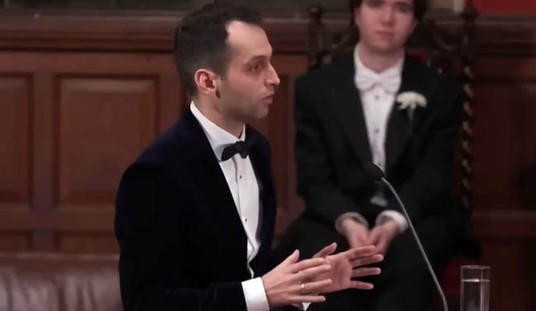We must have solved all our other problems if the Obama administration is aiming at cell-phone use while driving. In his interview with Bloomberg, Transportation Secretary Ray LaHood says he may push for an all-out ban on the practice, even when conducted by “hands-free” technology, depending on the results of research LaHood is authorizing. Perhaps he should also research jurisdiction and enforcement as well (via The Week):
LaHood, whose campaign against texting and making calls while driving has led to restrictions in 30 states, says his concerns extend to vehicle information and entertainment systems such as Ford Motor Co.’s Sync and General Motors Co.’s OnStar.
“I don’t want people talking on phones, having them up to their ear or texting while they’re driving,” LaHood said in an interview this week. “We need a lot better research on other distractions,” including Bluetooth-enabled hands-free calls and the in-car systems, he said.
Even without a ban, which would have to be implemented by individual states, LaHood’s escalating campaign may limit the growth of vehicle features such as Sync, being added by automakers to attract younger buyers. His push also may reduce calls made from vehicles and the revenue of mobile-phone companies such as Verizon Wireless and AT&T Inc.
LaHood, 64, said even hands-free phone conversations are a “cognitive distraction.” Calling for a ban on hands-free communications is a possible outcome of research under way at the Transportation Department’s National Highway Traffic Safety Administration into all driver distractions, Olivia Alair, a department spokeswoman, said.
Well, there are a lot of cognitive distractions in driving. Part of becoming a good driver is learning how to manage them. For instance, the radio can be a distraction, especially satellite radio receivers with more complex dialing processes. Passengers in the car can be a big distraction, especially children. Shall the federal government ban them as well?
Nor are the distractions limited to inside the car. Every Thursday, an anti-war group stages a “honk” protest at a major intersection in my city that noticeably slows traffic, designed to distract drivers by waving signs and requesting that they honk in support, which is doubly distracting. Unions on picket lines often do the same thing. Shall we ban them, too?
Of course we don’t want to ban street protests, satellite radio, or children in cars. We want drivers to act responsibly when piloting their lethal assembly of steel and aluminum around town, and so we pass sensible safety laws to protect all of us, including the drivers, such as speed limits, rights-of-way, signaling requirements, and the like. Those have to do with interactions with other vehicles and pedestrians around the car. We presume that the driver will manage his own “cognitive distractions” when we license him.
However, even if we decided to ban cell phones, how exactly would that work? LaHood is talking about using federal pressure, probably via transportation funding, to get the states to enact and enforce the bans, which amounts to a giant unfunded mandate on state and local law enforcement. Not only is that inappropriate, it’s completely unrealistic. How many police officers will even see a cell phone being used while driving? Even when they do, is it a good use of limited law enforcement resources to go after cell-phone users rather than, say, speeders and those making unsafe lane changes?
Most drivers can handle a hands-free cell phone call without getting unduly distracted from driving. States can make their own decisions on how to approach the issue; most states now require the hands-free approach, but thus far it doesn’t seem to have increased safety, nor has cell phone use made the roads markedly less safe since their introduction, anecdotal evidence aside. The Department of Transportation should focus on structural safety in roads and bridges on the federal highway system, and leave the other decisions on law enforcement to the states that will have to fund those efforts.
Update: Take the poll!
Update II: Rob Port notes that this comes as traffic accidents and fatalities are actually declining.









Join the conversation as a VIP Member